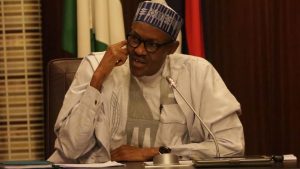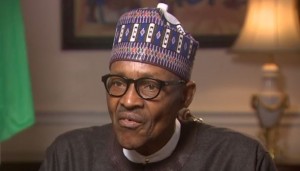
Leadership / Nigeria: President Muhammadu Buhari has admitted that Nigeria is a difficult country to govern in view of the many interests in the country and the challenges it is plagued with, but said his government is on the right path to make a difference.
In an interview at the Presidential Villa, to commemorate his first anniversary as democratically elected president, the president said governing Nigeria had been made difficult following years of misrule, which resulted in the insecurity problems manifesting in the form of Boko Haram in the northern part of the country, militancy in the Niger Delta, youth unemployment and corruption.
“For the unemployment, it became clear when we became a mono-economy, we left agriculture, we left solid minerals and everybody rushed to the town to get oil money. Now we’ve found out that that oil money is not available.
“On corruption, how can you be given $2.1 billion not even naira to go and buy weapons to fight insurgents and you sit as if you are going to have your breakfast or lunch and share the money and put it into your accounts, as if nothing will ever happen? That is on armament alone and one part of it, not to talk of when political money was being raised for the elections. The Central Bank, NNPC, Customs and all these places, you know where everybody was collecting money for contribution to campaign funds,” Buhari said.
The president said his biggest shock however was when he found out that most of the country’s foreign exchange was spent on food importation.
“Now, the biggest shock is when we broke down with oil less than $40, I asked the governor of Central Bank to go and bring me what we have been buying with this foreign exchange and he came back and it was all food items, beginning with toothpick, tomato paste, some grains, that is not possible. All those billions of dollars would be spent on food? I believe 60 per cent of Nigerians from the east, from the west, from the north, 60 percent of them grow what they eat whether it is gari, whether it is tubers of yam or whether it is grains. So what was happening, was that those people who have plenty of naira in their hands changed it into dollars and then they got this done.”
The president also hinted that he was considering devaluation of the naira but reiterated that he was yet to understand the economic benefit of further devaluation of the country’s currency, hence his consistent refusal to yield to economists who had been pressurising him to do it.
He added that inspite of his reluctance on the issue, running the country is a collective responsibility so he may have to yield to the economists.
“Yes I think all my countrymen and women know about the cost of fuel and so on but again this is another thing I have experience on. In 1984 and 1985, I was advised to devalue the naira, remove petroleum subsidy, whatever their perception of subsidy is in Nigeria, and then remove subsidy on flour. The IMF and co were very hard on me, I refused to do it. My reason is this, people who devalue their currencies, if you notice, are developed countries, where they have factories in place that produce their local requirements and excess to export. Their infrastructure in communication and railways, roads transportation and so on were good enough. So if they devalue their currency, they pay their goods competitively with their trading partners. So they sell more outside, which means they produce more at home, employ more people. Now, recall what I have just told you about Nigeria, when I asked for a list they were all food items and these are lies, people were just taking the money out. How many factories have we built? I therefore refuse to devalue the naira.
“…at the time I was removed, N1 was going for $3 and you need N350 now to get a dollar. I challenge Nigerian economists to tell me what benefit Nigeria got from that devaluation, how many factories have we built by killing the naira? So I must reluctantly give up because of the so called Nigerian economists. They come and talk things to you which is part of my experience, they go over my head instead of inside my head.
“For us to lose over N300 in 30 years, that is every year we are losing the value of N100, every year our naira is losing a hundred of its value, what for? Let them tell me how many factories have they built? So I find myself in a very difficult place because the economists cannot explain to me such culture, why we should continue to devalue our naira. People would say import. What are we importing? We found out that we are just importing food and it is wrong. We are making a plan and in three years’ time, we will not import rice, we will not import wheat, we will not imports grains. It is possible, we can make it. …So I told you, I am still agonising over it. I am still waiting for you Nigerian economists to convince me why our naira should be reduced to that disgraceful level over the last 30 years, for what benefit I don’t know. I need to be educated but I will not rule this country alone. I am under pressure and we will see how we can accommodate the economists,” he explained.
President Buhari further clarified that contrary to popular opinion, he was not against privatisation of the nation’s refineries but that he was against privatising them as scrap, which would constrain the country to negotiate with the investors from the point of weakness and not get full value for them.
He said, “yes, privatisation of refineries, I believe in privatisation. It is much more efficient but when you are going to do it, please look at your state of development as an issue.
“I am not against privatisation but let us consider our state of development, we can’t spend so much money of our assets to build these things and just sell it as scrap. I think it would be a disservice to the country. So please get me correct, I am not against privatisation but I am conscious of our state of development. If those that will be given the refineries, it is just given to them as scrap may be to dismantle it and so on, no. Let us repair them and then we can negotiate with them and then negotiate with marketers. If we repair these refineries, say they refine 400,000 barrels per day, then when we come to negotiate, we can negotiate from a position of strength instead of a position where we only have scrap. We say okay, if you don’t buy them at this amount, we will be refining 400,000 barrels per day and selling it if you can’t bring the balance and at least we give them some competition so that they don’t have to dictate how much we sell products in the country. I think it is an economic strategy which even the economists would reluctantly agree.”
The president also gave an elaborate explanation of how he intends to develop the Boko Haram ravaged North-east geopolitical zone. He said he had through the Attorney General prepared a draft of a legal instrument of the region which he sent to the Gen Theophilus Danjuma-led Victim Support Fund for input but along the line, the document got into the hands of technocrats and when the document was sent back to him, so much had been added to it that it assumed the status of another government with so many governors and other people involved to the extent that if left that way, most of the money would go as overhead.
“So honestly, I think I will remove this one; I will go back to the original draft from the Ministry of Justice and put a few people, may be the four states or five states or six, that is Yobe, Borno, Adamawa, Gombe, Bauchi and Taraba and each of the states would send a senior director from the Ministry of Works, Ministry of Education, Ministry of Health and of course from the governor’s office so that we can form a small committee and then whoever comes to help, NGOs whether from Nigeria or from outside, the series of committees to be controlled by the main committee of General Dajuma, we ask them to brief them and if necessary, take a tour of the damaged areas and see what they can do. I don’t want anybody to come and say he gave the federal government this amount of money.
“If the United Nations comes then we identify a project United Nations should do in that area. I got a lot of people, retired people but not tired, you know, that can manage things like that. This may take another two weeks or more to be on the ground so this is what we intend to do. But I don’t like very very big organisations that just consume but then don’t produce.”
Odigie-Oyegun: APC has repaired Nigeria’s tarnished image
The All Progressives Congress (APC) yesterday said the party has repaired the nation’s previously tarnished image and that frantic efforts are being made to tackle economic and security challenges rocking the country.
The party in a statement signed by its National Chairman, Chief John Odigie–Oyegun, said the President Muhammadu Buhari-led government was aware of the tough economic challenges facing Nigerians and had directed its focus on the salvaging of the nation’s battered and prostrate economy.
“President Buhari has, in the last year, worked hard to repair Nigeria’s previously tarnished image in the international community; restored the territorial integrity of our country by ensuring the containment of the erstwhile rampaging Boko Haram insurgency and has waged an unrelenting and vigorous war against corruption as he promised in his electioneering campaign,” the party said.
The APC noted that the parlous state of the country’s economy inherited by the current administration had been further battered by the collapse of the price of crude oil and the massive corruption by the past administration, but the present government had courageously faced the challenges by taking tough decisions necessary to bring the economy back to buoyancy and self-sustaining growth.
“One of such tough but inevitable decisions is the liberalisation of the petroleum downstream sector and the consequent hike in petrol price which led to a call out of workers on an indefinite strike by organised labour.
“We thank Nigerians for their understanding of the situation and also organised labour for resuming negotiation with government.
“I want to assure that the APC administration of President Buhari holds your trust to be sacred and will do all that is humanly possible to ensure that these tough times do not last. The 2016 budget which includes N500 billion dedicated to social intervention will begin to have positive impact very soon,” it added.
APC appealed to Nigerians to put aside their differences and join with President Muhammadu Buhari to design and lay a strong foundation for a new economy that assures self-sustaining growth and shared prosperity for our people.
“Twelve months ago, President Muhammadu Buhari was sworn into office after the decisive victory of our great Party in the general elections that marked 16 years of unbroken democratic rule in Nigeria.
“On behalf of the National Working Committee, elders, leaders and the teeming members of our party, I wish to convey my immeasurable gratitude to our fellow compatriots for their unprecedented confidence and trust in President Muhammadu Buhari and the party.
“The APC assures all Nigerians that the Party and the President hold as very sacred this collective trust, which the President has so creditably discharged this past one year,” the statement read in part.
NASS will strengthen democracy with legislation – Dogara
The Speaker of the House of Representatives, Hon. Yakubu Dogara, congratulated Nigerians on the occasion of this year’s Democracy Day and 17 years of uninterrupted civil democratic rule in Nigeria and said, as a major symbol of democracy, the House of Representatives under his leadership, would continue to strengthen the nation’s democratic growth and development through legislations for the needs and aspirations of Nigerians.
The Speaker said the milestone event called for sober reflections on the nation’s achievements and failures as a democratic country.
In a statement issued by his spokesman, Mr. Turaki Hassan, he said the 2015 general elections that brought the opposition party headed by President Muhammadu Buhari to power showed that Nigeria’s democracy had matured and come of age.
Dogara called on Nigerians to patiently await the results of the current policies and actions of government which according to him, would soon begin to yield positive results.
“As Nigeria faces serious economic challenges as a result of dwindling oil revenues and mismanagement of our resources, Nigerians should be hopeful and trust the capacity of the current democratically elected government to confront these problems and provide lasting solutions.
“It is not an easy task and we are not yet there, but with hard work, commitment, dedication and patriotic zeal on the part of all Nigerians and good, accountable and corrupt- free government by leaders, our democracy will soon begin to deliver on its promise of life, liberty and the pursuit of happiness,” he added.
Keep faith with the country, Mark Tells Nigerians
Former President of the Senate, Senator David Mark also urged Nigerians not to despair in the face of the daunting economic and socio-political challenges but remain steadfast for the country’s democracy to endure.
In a goodwill message to Nigerians yesterday in Abuja, to mark this year’s Democracy Day, he noted that it was by deliberate choice and design that the nation chose presidential democracy as the best form of government because it is representative and participatory.
He further pointed out that this year’s Democracy Day is unique, “because it is the first time in the last 17 years of uninterrupted civilian administration that an opposition political party is in charge.”
In spite of some criticisms, the former Senate president noted that the solid foundation the Peoples Democratic Party (PDP) administration put in place for 16 years, guaranteed the congenial atmosphere that enabled an opposition party to win elections.
“The PDP provided the enabling environment for democracy to thrive. It never hindered or prevented opposition parties from operating. Everyone had access and the political space was free for all.
“For 16 uninterrupted years, the PDP discharged firmly and competently the popular mandate of governance of Nigeria through four unprecedented political transitions which included the first ever transition of power from a ruling political party to opposition party in our county.
“By this, the PDP ensured that after a largely fruitless search since independence, democracy as a form of government has come to stay as the norm. Today, whether the same scenario is available in our country is up to the citizenry to judge, whether life is better now or then is however debatable,” Mark said.
He added however, that “this is our country, whichever side of the divide one finds him or herself, we must strive to play such roles honestly and patriotically in order to make our country a better place.”
Mark further urged governments at all levels to initiate policies and programmes that are in consonance with the wishes and aspirations of the people, pointing out that any programme or policy that tends to bring misery on the citizenry cannot be adjudged a good package and also called for an egalitarian society where every citizen irrespective of political, religious or ethnic leaning is free to pursue his or her legitimate ambition anywhere in the country without fear of molestation or intimidation.
Similarly, the National Orientation Agency (NOA), charged Nigerians to rise up to the task of defending Nigeria’s unity in line with the national pledge as the need for national cohesion is more real now than ever.
Director General of NOA, Dr. Garba Abari, in a congratulatory message to Nigerians on the occasion of the 2016 Democracy Day celebration, emphasised that the responsibility of ensuring the unity of the nation and the sustenance of its democracy is the task of all Nigerians.
He also commended the citizenry for massively supporting the President Muhammadu Buhari administration to deliver on its Change Agenda, noting that the successes so far recorded by the administration in security and anti-corruption would not have been possible without popular support.
According to him, “At such a time in our history when we are sending elements of terror and disintegration into extinction, they are showing evidence of defeat by attempting to sow seeds of discord across the country using veiled attacks. But Nigerians are not fooled and we must not allow anyone pitch us against ourselves by fanning the embers of ethnic rivalry”.
Dr. Abari also charged Nigerians to use the 2016 Democracy Day to reflect on their individual contributions to national development with a view to making more meaningful inputs in the years ahead. He therefore urged Nigerians to embrace patriotism and make necessary sacrifices in the interest of building a better Nigeria for all.




